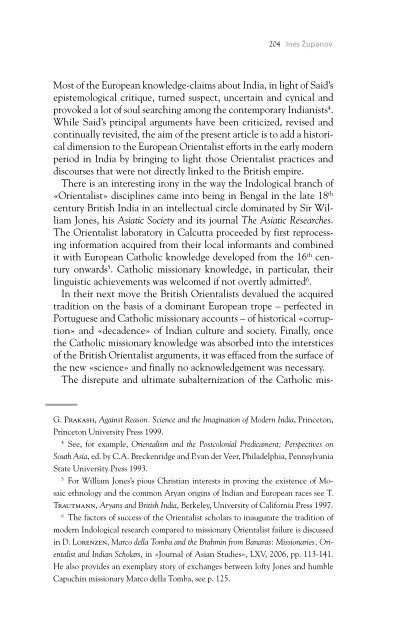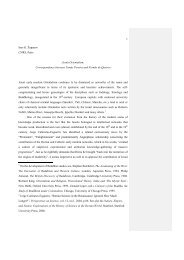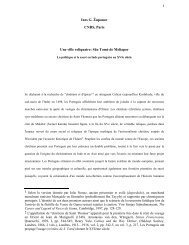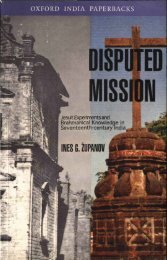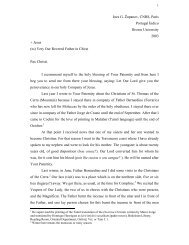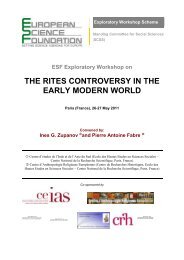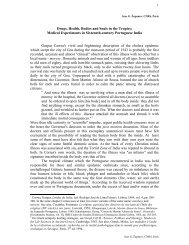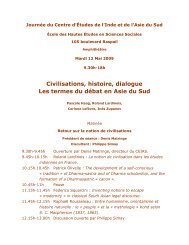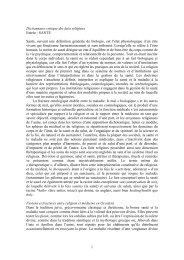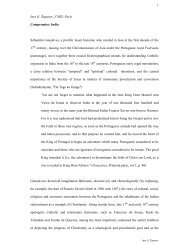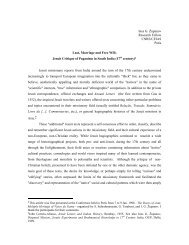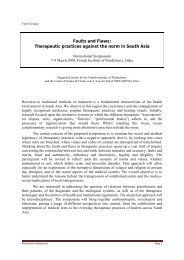Professional Missionary and Orientalist Curator ... - Ines G. Županov
Professional Missionary and Orientalist Curator ... - Ines G. Županov
Professional Missionary and Orientalist Curator ... - Ines G. Županov
Create successful ePaper yourself
Turn your PDF publications into a flip-book with our unique Google optimized e-Paper software.
204 <strong>Ines</strong> <strong>Županov</strong><br />
Most of the European knowledge-claims about India, in light of Said’s<br />
epistemological critique, turned suspect, uncertain <strong>and</strong> cynical <strong>and</strong><br />
provoked a lot of soul searching among the contemporary Indianists .<br />
While Said’s principal arguments have been criticized, revised <strong>and</strong><br />
continually revisited, the aim of the present article is to add a historical<br />
dimension to the European <strong>Orientalist</strong> efforts in the early modern<br />
period in India by bringing to light those <strong>Orientalist</strong> practices <strong>and</strong><br />
discourses that were not directly linked to the British empire.<br />
There is an interesting irony in the way the Indological branch of<br />
«<strong>Orientalist</strong>» disciplines came into being in Bengal in the late 18 th<br />
century British India in an intellectual circle dominated by Sir William<br />
Jones, his Asiatic Society <strong>and</strong> its journal The Asiatic Researches.<br />
The <strong>Orientalist</strong> laboratory in Calcutta proceeded by first reprocessing<br />
information acquired from their local informants <strong>and</strong> combined<br />
it with European Catholic knowledge developed from the 16 th century<br />
onwards . Catholic missionary knowledge, in particular, their<br />
linguistic achievements was welcomed if not overtly admitted .<br />
In their next move the British <strong>Orientalist</strong>s devalued the acquired<br />
tradition on the basis of a dominant European trope – perfected in<br />
Portuguese <strong>and</strong> Catholic missionary accounts – of historical «corruption»<br />
<strong>and</strong> «decadence» of Indian culture <strong>and</strong> society. Finally, once<br />
the Catholic missionary knowledge was absorbed into the interstices<br />
of the British <strong>Orientalist</strong> arguments, it was effaced from the surface of<br />
the new «science» <strong>and</strong> finally no acknowledgement was necessary.<br />
The disrepute <strong>and</strong> ultimate subalternization of the Catholic mis-<br />
G. Prakash, Against Reason. Science <strong>and</strong> the Imagination of Modern India, Princeton,<br />
Princeton University Press 1999.<br />
<br />
See, for example, Orientalism <strong>and</strong> the Postcolonial Predicament; Perspectives on<br />
South Asia, ed. by C.A. Breckenridge <strong>and</strong> P.van der Veer, Philadelphia, Pennsylvania<br />
State University Press 1993.<br />
<br />
For William Jones’s pious Christian interests in proving the existence of Mosaic<br />
ethnology <strong>and</strong> the common Aryan origins of Indian <strong>and</strong> European races see T.<br />
Trautmann, Aryans <strong>and</strong> British India, Berkeley, University of California Press 1997.<br />
<br />
The factors of success of the <strong>Orientalist</strong> scholars to inaugurate the tradition of<br />
modern Indological research compared to missionary <strong>Orientalist</strong> failure is discussed<br />
in D. Lorenzen, Marco della Tomba <strong>and</strong> the Brahmin from Banaras: Missionaries, <strong>Orientalist</strong><br />
<strong>and</strong> Indian Scholars, in «Journal of Asian Studies», LXV, 2006, pp. 113-141.<br />
He also provides an exemplary story of exchanges between lofty Jones <strong>and</strong> humble<br />
Capuchin missionary Marco della Tomba, see p. 125.


